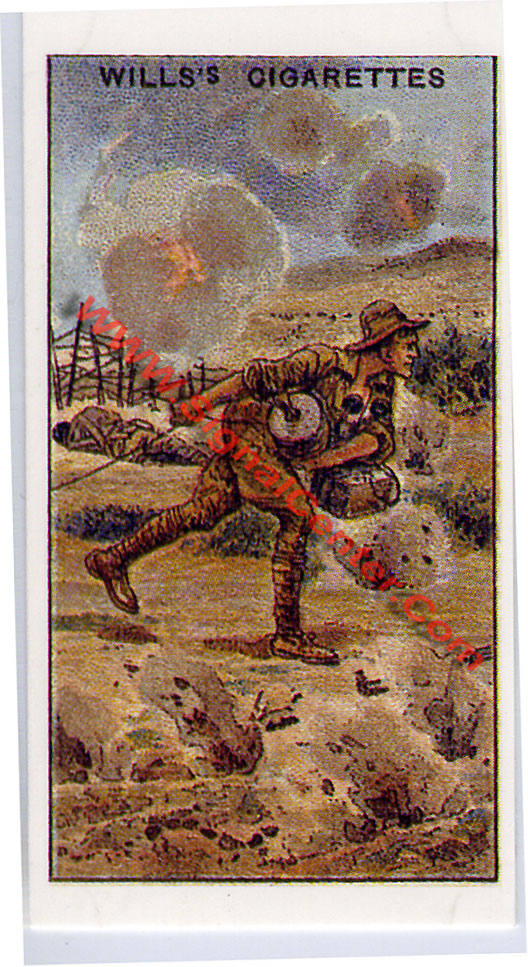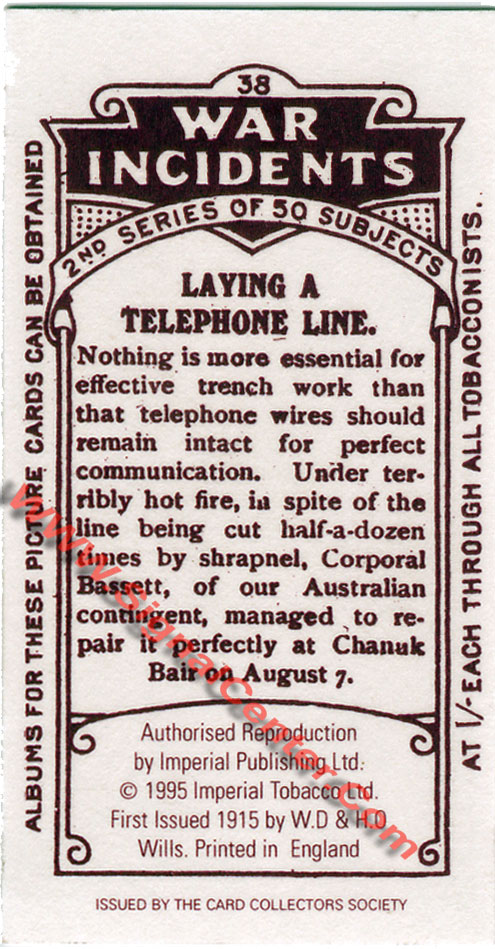Return to Thumbnails Page


WWI Wireman in Action, 1915 "Laying a Telephone Line"
Copyright -- 1995 Imperial Publishing LTD, Imperial Tabbaco LTD,
Issued by the Card Collector's Society
The text inscription cites the brave actions of an actual Australian soldier, Corporal Basset, at Chanuk Bair. The artist's depiction of Corporal Basset's image shows him dispensing wire from a reel and clutching a headset and a cumbersome, heavy field telephone under his left arm; same basic fundimental principal of checking the periodic integrity of the wire as it is dispensed. Today, a wireman uses a lightweight TA-1/PT field telephone strapped or clipped to the waist pistol utility belt while dispensing wire. This brave Australian soldier is running through a barrage of Artillery -- notice the dead soldier in the background.
 |
 |
Warning! War story coming: "Wire Dogs," as our Commo Section's wiremen were commonly referred to connotes sheer physical perseverance and endurance -- darn, sweaty, exhaustive, hard work reestablishing "Commo" after tanks or artillery damaged the wire communications between the battalion headquarters and to the line companies; In 1970 at Fort Bragg, NC. with the 82nd Airborne Division, I was assigned to the the 4/68th Armor Battalion (Airborne) as the Battalion's Signal Officer. I had a motley, communications section of wiremen, 17 and 18 year old men (some unruly boys with "FTA" attitudes -- not all, to be fair ). My wire section ( "Commo" ) worked their butts off during field manuevers. Motivating young soldiers at 3:AM to repair the wire to "Alpha" Company was a monumental task . As a young Signal Corps second Lieutenant, fortunate to have a super-strong leader of a Commo Chief (sergeant), we had to demonstrate extraordinary leadership (and exceptional motivational )skills to shake and wake already exhausted soldiers out of their warm, comfortable, sleeping bags (fart bags) to repair damaged commo wire (wd-1/tt). When tactically feasible, my Commo Chief or I would accompany them (we alternated), if only to share the misery, and encourage (usually strong-arm motivation) them. Not a pleasant experience, especially in the dark, through mud, snow, and/or rain and with tactical light-discipline in force ( flashlights, with the red filters.) We all shared the "Switchboard watch." When communications was great, we were praised by the Battalion Commander; when it was bad, the Battalion Sergeant Major would refer to us with a resounding "F..king Commo!". Although only a lowly 2nd Lt (butter bar), I had no qualms about locking that beligerent Sergeant Major's heels at the position of attention, while "loudly, in turn, chewing" him out for his caustic epithets aimed at my hard working "Wire Dogs." He was a seasoned, Vietnam combat infantry senior NonCom. In retrospect, I guess, he played along with me; the battalion commander never critized me for it -- I think both were more amused at my ludicrous audacity to confront the "Top" Battalion Noncommissioned Officer.
Great memories! Oh, I went to the "school for boys" for my commission -- that is the Fort Benning Infantry Officer Candidate School (OCS); my previous 3 years enlisted experience in electronics (repairman specialty "MOS" in radios, switchboards, and field telephones) (82nd Abn Div) qualified me for commissioning in the Signal Corps.
I was also a "Commo Officer" for the 1/2 Mech Infantry at Fort Riley and the "Black Lions" 3rd Bn 28th Infantry (Mech) in Germany. And Division Artillery Signal Officer (DivArty Sig Off) at Fort Riley before the advanced signal course at Fort Gordon -- lots of experience with field tactical radios, switchboards and field telephones.
Return to Thumbnails Page





